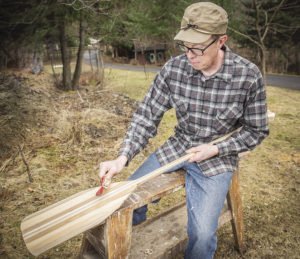Duluth—Bryan French’s job fell victim to some budget cuts at the University of Minnesota – Duluth (UMD) a few years back. He brainstormed his next move with Tim Bates, a staff member in the Recreational Sports Outdoor Program at UMD.
Bryan French told the origin story.
“I told Tim we should start a folk school. Tim gets a funny look on his face, pushes his chair back, goes into one of his file drawers, and pulls out a business plan. ‘Funny you should say that,’ he says.”

That’s how the Duluth Folk School was born, with French and Bates as co-founders. Their paperwork went through in November 2015 and the school held its first class in May 2016.
The Duluth Folk School makes a trio in the Arrowhead Region, joining the Ely Folk School and the venerable North House Folk School in Grand Marais. The North House Folk School was founded in 1997, and the Ely Folk School, founded in May 2015, has a one-year head start on Duluth.
“We don’t view ourselves in competition with Ely or North House. We’re not trying to compete. We’re trying to supplement,” said French.
He then quoted John Latimer, of KAXE radio, as saying, “There should be a folk school in every community in the world.”
What is a folk school? “A folk school in general is a place where people go to learn traditional skills, to learn crafts, to work with their hands and to experience life at a slower pace and at a more hands-on pace,” said French.
He referenced the John C. Campbell Folk School in North Carolina as the “juggernaut of folk schools.”
French said, “The Duluth Folk School should do three things: teach people to do things, build community, and have a good time. We say that everywhere we go.”
The Duluth Folk School has offered classes in chainsaw use, bicycle maintenance, skijoring, knot tying, and sawhorse construction using timbers, to name a few. Upcoming classes include home brewing, sheep shearing, and canoe paddle construction.
“When people think of a folk school,” French said, “a lot of people think they’re going to leave with a thing. But they could be leaving with a skill. They could be leaving with a competency they didn’t have previously.”
The Duluth Folk School isn’t a non-profit, unlike its two neighboring schools.
“We thought long and hard about non-profit vs. profit structure,” said French.
Technically, the Duluth Folk School is an LLC, but Bates and French plan to act like a benefit corporation. Benefit corporations serve the shareholders, but also create public good and contribute to environmental stewardship.
There are several examples of their commitment to this business model. A major storm in the summer of 2016 destroyed a yurt in Hartley Park—they donated money to help rebuild it. An upcoming class will teach basic woodworking—the end product will be kestrel boxes that will be given to the Friends of the Sax-Zim Bog. The Duluth Folk School also reclaimed wood from the floor of a church and the Duluth Rowing Club boathouse, so it could be reused at Camp Miller.
Their goals include paying their instructors a good wage and doing business with local vendors.
“We want to focus on providing opportunities based on instructors from the Twin Ports and surrounding communities,” said French. “We want to make it worth the instructors’ time.”
Sometimes, dealing with local vendors is more expensive, but French said, “It’s the right thing to do.”
Right now, after paying their bills, they save funds for a permanent home. They currently float between four different locations in town, including a rented building in the Lincoln Park area of Duluth.
“If we had a building, we could have ongoing classes. It’s a chicken or the egg thing,” said French.
They need more classes to buy a building, but they need a building to hold more classes. However, French’s energy is contagious.
“Everyone we speak with is enthusiastic about this idea. They say, ‘I love this idea!’ I believe that having a good, strong folk school is going to be part of why people want to come to Duluth. The fact that we are serving this community is one of Duluth’s competitive advantages,” French said. “Duluth has some pretty sweet stuff going on. I’d like to think we’re part of that.”
For more on the Duluth Folk School, visit: duluthfolkschool.com.
